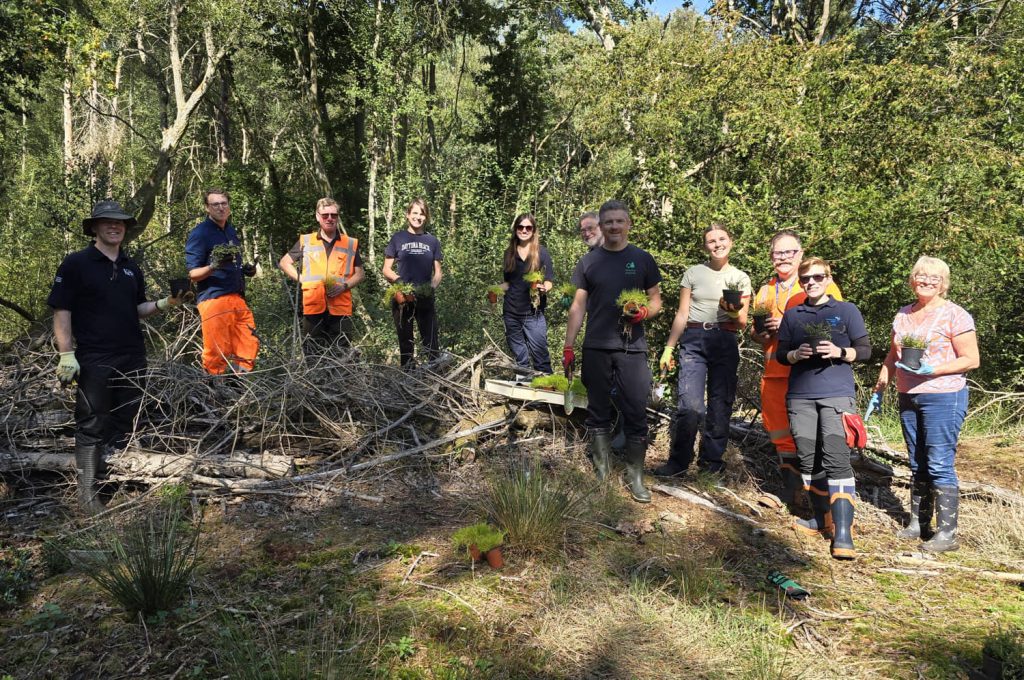Portsmouth Water and volunteers came together to boost biodiversity at Havant Thicket Reservoir

As part of its flagship Havant Thicket Reservoir, Portsmouth Water held a volunteer planting day in September 2025 with experts from Kew’s Millennium Seed Bank.
Together, the group planted more than 380 wetland plants, including Marsh St John’s wort, Floating club-rush, and Lesser skullcap, in Forestry England’s Havant Thicket woodland which is next to the reservoir site.
The volunteer team included members of the reservoir’s Stakeholder Advisory Group, made up of representatives from local community and environmental organisations, as well as Forestry England, who manage the woodland and have been carrying out improvements to these ponds, and other key project partners.
The species planted were germinated and grown from seeds in Kew’s Millennium Seed Bank, collected from local sites across southern England, and carefully nurtured by horticultural and conservation experts.
Christopher Cockel, UK Conservation Projects Coordinator at the Royal Botanic Gardens, Kew’s Millennium Seed Bank, said: “It was a fantastic day at Havant Thicket woodland, with such a brilliant group of volunteers all invested in the project. Together, we planted 386 plants, a real testament to what many hands can achieve!
“My role at Kew focuses on making the most of our seed collections to support species restoration across the UK, and projects like this highlight the real impact our work can have. This year is particularly special as the Millennium Seed Bank celebrates its 25th anniversary, demonstrating a long-standing commitment to conserving native plants and supporting biodiversity.”
Bob Taylor, Chief Executive Officer of Portsmouth Water, said:
“I would like to say a big thank you to everyone who volunteered at our planting day and contributed to its success. The event was a brilliant opportunity to come together and make a real difference to the environment here.
“Once complete, the new reservoir will play a fundamental role in protecting two of Hampshire’s precious, world-renowned chalk streams, the River Test and River Itchen, but our commitment to the environment goes much further than this. As part of the project, we’re delivering an environmental net gain for the local area which includes planting and improving more than 200 hectares of woodland and wood pasture. In recent years, we’ve translocated around 450 trees, plants, and saplings with the help of volunteers and the volunteering day last week built on this success.
“It’s also been a real privilege to work with Kew’s Millennium Seed Bank on this project. Their expertise and dedication to restoring native plants is truly inspiring, and their work is making a tangible difference to biodiversity here at the Havant Thicket Reservoir project.”
The day formed part of a wider project to relocate three locally rare aquatic plants from within the reservoir site ahead of construction and introduce them to ponds within Forestry England’s Havant Thicket woodland, next to the site. Planning for this work has been undertaken since 2021, with overall coordination led by Atkins Réalis. Preparation has included improvement works to the local ponds including increasing the amount of light that reaches them and removing invasive species present. This work was undertaken by Forestry England and Penfolds.
Baseline surveys to identify suitable ponds for the wetland plants grown by Kew have been undertaken by Richard Lansdown, one of Europe’s leading aquatic plant specialists, and APEM Ltd. We will continue to monitor the planting going forward to check it’s been successful.
Volunteers also included representatives from Future Water, the main reservoir works contractor at Havant Thicket Reservoir.
For more information about Havant Thicket Reservoir, please visit Havant Thicket Reservoir project